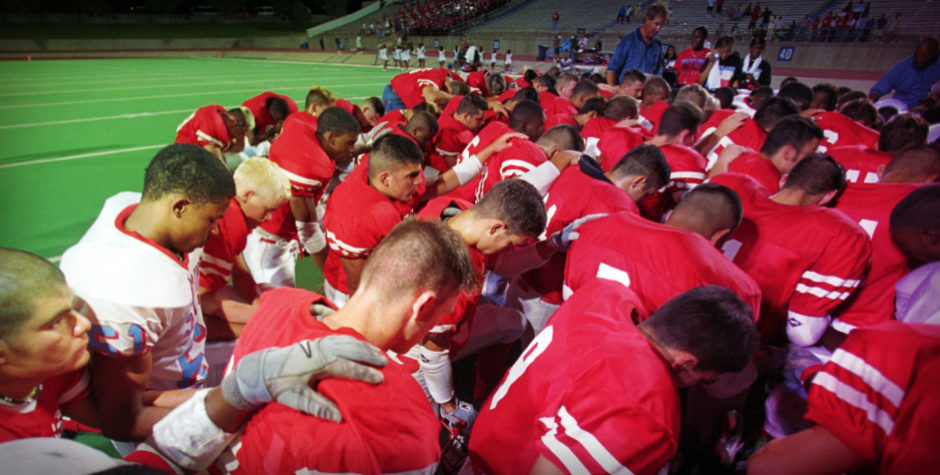Victory for Religious Speech as Appellate Court Reinstates Christian Students’ Suit for Right to Publicly Pray at High School Football Game
The constitutional rights to free speech and to the free exercise of religion won an important victory in the federal court of appeals in the case of Cambridge Christian Schools v. Florida High School Athletic Association.
The American Center for Law and Justice (ACLJ) filed an amicus brief in the case, on behalf of itself and the ACLJ’s Committee to Stop Censorship of Christian School Prayer, supporting the Christian school plaintiff.
The dispute arose from a high school championship football game in 2015. Both teams in the final game were Christian schools, and the teams wanted to open the game with a prayer carried over the loudspeaker system.
The Cambridge Christian School contended that it had already been permitted to pray over the public address system at previous playoff games and at a past championship game. But as we stated in our amicus brief the Florida HS Athletic Association (FHSAA), which was running the tournament, had “what might be characterized as the constitutional equivalent of a severe allergic reaction” to the proposed religious speech. Invoking the “separation of church and state,” the FHSAA nixed the use of the PA system for the prayer.
Cambridge Christian sued, alleging a violation of its First Amendment rights to free speech and the free exercise of religion. A federal trial court dismissed the suit, and Cambridge Christian appealed. The ACLJ weighed in with the previously mentioned amicus brief, in which we made several points:
The FHSAA [claims] that no one aside from FHSAA officials is allowed to use the loudspeaker. This defense must be set aside as legally irrelevant, factually incorrect, and procedurally improper.
First, FHSAA’s assertion is legally irrelevant. [E]ven if the government otherwise has the power to do something, it cannot do so in an unconstitutional manner, such as by engaging in viewpoint discrimination. . .
Second, FHSAA’s allegation that no private parties could use the PA system is not true – or at best, is highly dubious. FHSAA . . . does not dispute that on at least one prior occasion a pre-game prayer was broadcast. Moreover, . . . while repeatedly denying the two schools’ requests to borrow the loudspeaker for a few moments for their prayer, at no time did FHSAA invoke a supposed policy that no one else gets to say anything over the speaker. Rather, FHSAA’s sole objection was that a pre-game prayer would be religious speech, and that was not allowed.
Apparently, handing over the microphone for a brief word of secular rah-rah inspiration from a coach or team captain would have been perfectly fine. The problem FHSAA had was clearly with the religious viewpoint.
Third, FHSAA’s claim about limits on use of the PA system is procedurally misplaced. . . . “. . . A plaintiff’s allegations are accepted as true and we construe his complaint in the light most favorable to him.” . . . That is, FHSAA must show that it acted constitutionally, even assuming that FHSAA rejected an otherwise permissible request briefly to use the PA system solely because FHSAA objected to the religious perspective that use would embody.
That is a tall order.
A three-judge panel of the U.S. Court of Appeals for the Eleventh Circuit on Nov. 13, 2019, unanimously agreed that the case had to be reinstated: “As we see it, the district court was too quick to dismiss all of Cambridge Christian’s claims out of hand.”
The court specifically ruled that Cambridge Christian’s free speech and free exercise claims were entitled to “be heard” and should not have been dismissed at the outset. As to the free speech claim, the court took particular umbrage at the notion that FHSAA could allow prayers in some games and then suddenly pull out the rug in the championship, stating:
Permitting certain speech on Monday, Tuesday, Wednesday, and Thursday and barring precisely the same message on Friday without any credible explanation of what may have changed is the essence of arbitrary, capricious, and haphazard – and therefore unreasonable – decision making. . . .
We know that some pregame solemnizing messages of a different sort -- the presentation of colors, Pledge of Allegiance, and the National Anthem -- were considered appropriate . . . . And we know that the FHSAA saw no problem with the teams praying together at the 50-yard line before the game began. Most significantly, the fact that prayers were previously allowed over the loudspeaker plausibly suggests that the FHSAA did not consider them to be in conflict with the purpose of the forum, or at least that they were not in conflict on four prior occasions. . . .
[Therefore] Cambridge Christian has plausibly alleged that the FHSAA violated its free speech rights under the First Amendment.
Regarding the free exercise claim, the appeals court observed that “communal pre-game prayer is an important part of Cambridge Christian’s religious belief system.”
The court added: “Because the school was denied prayer over the loudspeaker, it was unable to engage in a communal prayer that united the team and the spectators,” and that an inaudible prayer huddle at midfield “is not the same thing.”
This case is still at an early stage. What the court of appeals did was conclude that Cambridge Christian had adequately alleged violation of its rights to free speech and the free exercise of religion. Now Cambridge Christian will have the chance to prove those claims.
At the ACLJ, we are glad we helped get Cambridge Christian that opportunity. We will continue to update you as the case proceeds.
Stand with us in defense of religious freedom and the right to pray. Sign our critical petition.
